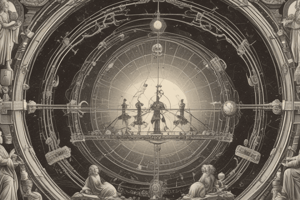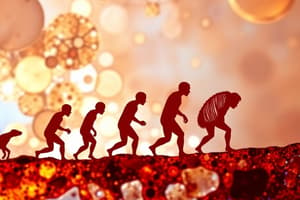Podcast
Questions and Answers
What term did the pre-Socratics seek to define as a fundamental principle in their quest to explain natural phenomena?
What term did the pre-Socratics seek to define as a fundamental principle in their quest to explain natural phenomena?
- Cosmos
- Ontology
- Arjé (correct)
- Logos
Which scientific methodology was established by Copernicus, Kepler, and Galileo during the Scientific Revolution?
Which scientific methodology was established by Copernicus, Kepler, and Galileo during the Scientific Revolution?
- Experimental observation
- Inductive reasoning
- Philosophical analysis
- Hypothetico-deductive method (correct)
Which figure is known for integrating Greek, Jewish, and Arab philosophical and scientific insights during the Medieval period?
Which figure is known for integrating Greek, Jewish, and Arab philosophical and scientific insights during the Medieval period?
- Roger Bacon
- Nicolaus Copernicus
- Saint Albertus Magnus (correct)
- Isaac Newton
What significant discovery is James Watson and Francis Crick known for?
What significant discovery is James Watson and Francis Crick known for?
Which scientist's theories revolutionized classical physics and contributed to the understanding of gravity?
Which scientist's theories revolutionized classical physics and contributed to the understanding of gravity?
What major advancement was notably impacted by scientific discoveries during the 20th century aside from scientific fields?
What major advancement was notably impacted by scientific discoveries during the 20th century aside from scientific fields?
Which branch of science did Aristotle significantly contribute to during the Ancient World?
Which branch of science did Aristotle significantly contribute to during the Ancient World?
Who was known for advocating the importance of combining experimentation with mathematics?
Who was known for advocating the importance of combining experimentation with mathematics?
Flashcards
What were the pre-Socratics' contributions to science?
What were the pre-Socratics' contributions to science?
The pre-Socratics were the first to investigate causal relationships between natural events, seeking a fundamental principle (arjé) to explain and unify them. They emphasized observation and reasoning, laying the foundation for scientific inquiry.
How did science evolve during the Medieval period?
How did science evolve during the Medieval period?
Medieval scholars blended Greek, Jewish, and Arabic scientific knowledge with a Christian worldview. Notable figures like Saint Albertus Magnus and Roger Bacon advocated for the combination of experimentation and mathematics in scientific inquiry.
What characterized the Scientific Revolution?
What characterized the Scientific Revolution?
The 16th and 17th centuries marked a revolution in science. Copernicus, Kepler, and Galileo incorporated mathematics and rigorous observation to establish the hypothetico-deductive method, culminating in Newton's unification of astronomy and mechanics.
What major scientific revolutions occurred in the 20th century?
What major scientific revolutions occurred in the 20th century?
Signup and view all the flashcards
What is the hypothetico-deductive method?
What is the hypothetico-deductive method?
Signup and view all the flashcards
What is the 'arjé'?
What is the 'arjé'?
Signup and view all the flashcards
What was Newton's contribution to science?
What was Newton's contribution to science?
Signup and view all the flashcards
How does the information revolution relate to science?
How does the information revolution relate to science?
Signup and view all the flashcards
Study Notes
Science Throughout History
- Early science focused on establishing cause-and-effect relationships in natural phenomena.
- Early thinkers attempted to unify explanations for natural events.
- Ancient Greek philosophers, like Aristotle, laid foundations for fields like geometry, arithmetic, astronomy, zoology, and geology.
- The medieval era saw knowledge synthesis from Greek, Jewish, and Arab sources, viewed through a Christian lens.
- Key figures like Albertus Magnus and Roger Bacon emphasized experimental and mathematical approaches to scientific inquiry.
- The Scientific Revolution (16th and 17th centuries) saw a shift towards empirical observation and mathematical modeling.
- Figures like Copernicus, Kepler, and Galileo championed the heliocentric model and the experimental method.
- Newton synthesized astronomical and mechanical principles in a unified framework.
- The 20th century witnessed numerous scientific revolutions.
- Planck initiated quantum physics in the early 20th century.
- Einstein's theories of relativity revolutionized understanding of space, time, and gravity.
- Watson and Crick's discovery of DNA structure marked a significant advancement in biology.
- The Information Revolution, while primarily technological, relied on previous scientific advancements.
Rise of Experimental Science
- The Scientific Revolution marked a shift towards experimental science.
- Copernicus, Kepler, and Galileo challenged existing models and promoted observation.
- Experimental approach combined with mathematics became a crucial pillar of modern science.
- This new approach provided rigorous understanding of the universe.
- Isaac Newton's work united astronomy and mechanics through unifying principles.
Modern Science
- The 20th century saw major scientific revolutions.
- Planck's work initiated quantum physics.
- Einstein's theories of relativity reshaped understanding of space, time, and gravity.
- Watson and Crick’s discovery of DNA’s structure was a milestone in biology.
- The Information Revolution, driven by technology, significantly relied on prior scientific developments.
Studying That Suits You
Use AI to generate personalized quizzes and flashcards to suit your learning preferences.




